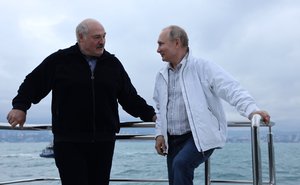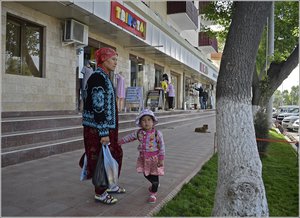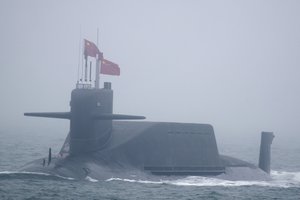-
The common foreign and security policy (CFSP) of the European Union - EU explained
The common foreign and security policy (CFSP) of the European Union - EU explained
Many of the EU's achievements and regulations can only be understood by looking at their long history.
Germany is taking the councils and other events during the German EU Council Presidency as an opportunity to take a look back at the emergence of different policy areas in the European Union.
At the same time, they ask:
How can the EU develop further in this area?
How did the EU's common foreign and security policy come about and what challenges will it be about in the future?
Now you can support my channel on Patreon: https://www.patreon.com/marcwesseling
Or become a member on my YouTube-channel: https://www.youtube.com/channel/UC5pgKp96s69MkWILz06jj1w/join
With your support you can help improv...
published: 16 Oct 2020
-
Main aspects and basic choices of the CFSP and the CSDP - extracts from the debate
Main aspects and basic choices of the common foreign and security policy and the common security and defence policy: extracts from the debate during the plenary session of January in Strasbourg. Statements by Federica MOGHERINI, High Representative of the Union for Foreign Affairs and Security Policy and Vice-President of the EC, Elmar BROK (EPP, DE), Richard Stuart HOWITT (S&D;, UK), Geoffrey VAN ORDEN (ECR, UK), Jozo RADOS (ALDE, HR) and Tamás MESZERICS (Greens/EFA, HU).
published: 14 Jan 2015
-
What's the Interparliamentary Conference on the CFSP and CSDP?
What's the Interparliamentary Conference on the CFSP and CSDP?
published: 23 Feb 2021
-
Customs 101: Customs Freight Simplified Procedures
As part of our continuing series of introductory customs 101 webinars, in this event we seek to set out the main elements of Customs Freight Simplified Procedures (CFSP).
It provides a board indication of the authorisation requirements, the CFSP reporting process and the control measure necessary to maintain an approval.
In addition, the webinar expresses the importance of CFSP in relation to Brexit and the proposed changes that are likely to come into effect.
published: 14 Dec 2020
-
European Defence
The Treaty of Lisbon established the European Union's Common Security and Defence Policy (CSDP) which substituted the former European Security and Defence Policy. The main aim of the CSDP is the promotion of security and peace. One of its key goals is to establish common European defence capabilities, but not necessarily a European army, as is often rumoured.
In 2012 the global and regional geopolitical environment began to change. Terrorism, violent extremism, and hybrid threats all presented new risks to security, peace and stability. This brought the European Union into a new mind-set about the future of its security and defence. Two of the main realizations were that it had to increase defence spending and that Member States needed to coordinate their defence capabilities. As a result...
published: 05 Jun 2018
-
EU CFSP - a definition
Abbreviation for 'common foreign and security policy', which was introduced by the Maastricht Treaty in 1992 to foster co-operation between EU member states in promoting peace and respect for human rights, defending the EU's values, interests and independence and making the EU more secure. In line with its policy of military neutrality, Ireland is not bound by any decisions about military action under the CFSP.
published: 27 Oct 2010
-
EU Common Security and Defence Policy in action
VIDEO AVAILABLE IN ALL 24 EU LANGUAGES (CLICK ON CAPTIONS)
The Common Security and Defence Policy (CSDP) is an essential tool in the foreign policy of the European Union. Since 2003, the EU has deployed some 30 missions and operations around the world. Taking the Horn of Africa as an illustration, this film highlights the contribution of CSDP to the EU's comprehensive approach to crisis management and how the CSDP translates into action on the ground. CSDP also offers the framework for enhanced cooperation among Member States by Pooling and Sharing military capabilities, the only way forward in a context of growing theats and budgetary limitations. It also supports the strengthening of the European defence industry, which is essential for the EU's strategic autonomy as well as a driver fo...
published: 13 Dec 2013
-
CFSE / CFSP - Why and How to Become One
This webinar will briefly share with you the importance of becoming a CFSE or CFSP and also will walk you through the process on how to become one!
As an engineer responsible for critical industrial processes, you face a myriad of challenges:
coping with new and changing standards
increased pressures for process uptime and plant safety
a growing list of responsibilities
decreased availability of support personnel
This makes it difficult to develop, maintain, and document the expertise needed to excel at your job, and the companies that you work for are being driven to run leaner operations and optimize performance. Completing a personnel functional safety certification program, such as the CFSE, can help address these challenges. Standards require proof of qualification, to insure safet...
published: 30 Jan 2015
-
Revisiting Decision-Making in the EU's CFSP: Time to Act?
This webinar was organised by the Leuven Centre for Global Governance Studies with the H2020 ENGAGE project, H2020 GLOBE project, and the EUDIPLO Jean Monnet Network.
This webinar revisits the current modes of decision-making in the EU’s Common Foreign and Security Policy (CFSP). Calls for QMV and a “core Europe” have recently resurfaced in Germany. What are the pros and cons of more majority-based decision-making in EU foreign policy?
Speakers:
H.E. Pierre Vimont is Senior Fellow at Carnegie Europe. He was the first Executive Secretary-General of the European External Action Service (EEAS), from December 2010 to March 2015.
Stephan Marquardt is Head of the Legal Department of the EEAS.
Dr. Karolina Pomorska is Jean Monnet Chair and Associate Professor in International Relations ...
published: 09 Jun 2021
-
Interparliamentary Conference for the CFSP & CSDP - Opening (11 October 2018)
Interparliamentary Conference for the Common Foreign and Security Policy (CFSP) and the Common Security and Defence Policy (CSDP) 11 - 12 October
The Conference for CFSP and CSDP deals with current questions of parliamentary control of the EU foreign defence policy. The meeting offers the opportunity for an exchange of views between the national parliaments, the European Parliament and the European Commission.
Opening of the Interparliamentary Conference
Welcome adresses:
- Wolfgang SOBOTKA, President of the National Council
- Inge POSCH-GRUSKA, President of the Federal Council
Introductory remarks:
- Andreas SCHIEDER, Chairperson of the Foreign Affairs Committee of the National Council
- Reinhard Eugen BÖSCH, Chairperson of the Defence Committee of the National Council
- David McALLI...
published: 12 Oct 2018
6:24
The common foreign and security policy (CFSP) of the European Union - EU explained
The common foreign and security policy (CFSP) of the European Union - EU explained
Many of the EU's achievements and regulations can only be understood by look...
The common foreign and security policy (CFSP) of the European Union - EU explained
Many of the EU's achievements and regulations can only be understood by looking at their long history.
Germany is taking the councils and other events during the German EU Council Presidency as an opportunity to take a look back at the emergence of different policy areas in the European Union.
At the same time, they ask:
How can the EU develop further in this area?
How did the EU's common foreign and security policy come about and what challenges will it be about in the future?
Now you can support my channel on Patreon: https://www.patreon.com/marcwesseling
Or become a member on my YouTube-channel: https://www.youtube.com/channel/UC5pgKp96s69MkWILz06jj1w/join
With your support you can help improve your YouTube experience on my channel and help me continue my educational work as a small YouTube Creator.
My TOP 5 best performing videos:
God save Britain: https://youtu.be/gG8s--eJPvo
Merkel warns of failure: https://youtu.be/xpq_YRloWbA
Consumers in trouble: https://youtu.be/pXp-FCSIJcM
Disaster is approaching: https://youtu.be/3aF_ZfObbmA
We can´t go on like this forerver: https://youtu.be/M7WTZzYC3OU
I spent some time in the UK and am a keen follower of what has happened in the house of commons recently. And besides my English friends from that time, I have German friends in the UK who will directly be effected by Brexit.
This way I can give you an outside view on Brexit. Whether it is about no-deal, the position of the EU, a new deal, May´s and Johnson´s withdrawal agreements, the general election, the blocked people´s vote (second referendum) or attempted independences, I will give you my view on latest news.
Due to the number of foreign viewers, I will continue with my english videos also for series regarding „German politics explained“ and „European Union explained“.
Subscribe: https://www.youtube.com/channel/UC5pgKp96s69MkWILz06jj1w?sub_confirmation=1
Source: German EU Council Presidency
#europeanpolitics
#eu
#europeanunion
https://wn.com/The_Common_Foreign_And_Security_Policy_(Cfsp)_Of_The_European_Union_Eu_Explained
The common foreign and security policy (CFSP) of the European Union - EU explained
Many of the EU's achievements and regulations can only be understood by looking at their long history.
Germany is taking the councils and other events during the German EU Council Presidency as an opportunity to take a look back at the emergence of different policy areas in the European Union.
At the same time, they ask:
How can the EU develop further in this area?
How did the EU's common foreign and security policy come about and what challenges will it be about in the future?
Now you can support my channel on Patreon: https://www.patreon.com/marcwesseling
Or become a member on my YouTube-channel: https://www.youtube.com/channel/UC5pgKp96s69MkWILz06jj1w/join
With your support you can help improve your YouTube experience on my channel and help me continue my educational work as a small YouTube Creator.
My TOP 5 best performing videos:
God save Britain: https://youtu.be/gG8s--eJPvo
Merkel warns of failure: https://youtu.be/xpq_YRloWbA
Consumers in trouble: https://youtu.be/pXp-FCSIJcM
Disaster is approaching: https://youtu.be/3aF_ZfObbmA
We can´t go on like this forerver: https://youtu.be/M7WTZzYC3OU
I spent some time in the UK and am a keen follower of what has happened in the house of commons recently. And besides my English friends from that time, I have German friends in the UK who will directly be effected by Brexit.
This way I can give you an outside view on Brexit. Whether it is about no-deal, the position of the EU, a new deal, May´s and Johnson´s withdrawal agreements, the general election, the blocked people´s vote (second referendum) or attempted independences, I will give you my view on latest news.
Due to the number of foreign viewers, I will continue with my english videos also for series regarding „German politics explained“ and „European Union explained“.
Subscribe: https://www.youtube.com/channel/UC5pgKp96s69MkWILz06jj1w?sub_confirmation=1
Source: German EU Council Presidency
#europeanpolitics
#eu
#europeanunion
- published: 16 Oct 2020
- views: 3512
15:53
Main aspects and basic choices of the CFSP and the CSDP - extracts from the debate
Main aspects and basic choices of the common foreign and security policy and the common security and defence policy: extracts from the debate during the plenary...
Main aspects and basic choices of the common foreign and security policy and the common security and defence policy: extracts from the debate during the plenary session of January in Strasbourg. Statements by Federica MOGHERINI, High Representative of the Union for Foreign Affairs and Security Policy and Vice-President of the EC, Elmar BROK (EPP, DE), Richard Stuart HOWITT (S&D;, UK), Geoffrey VAN ORDEN (ECR, UK), Jozo RADOS (ALDE, HR) and Tamás MESZERICS (Greens/EFA, HU).
https://wn.com/Main_Aspects_And_Basic_Choices_Of_The_Cfsp_And_The_Csdp_Extracts_From_The_Debate
Main aspects and basic choices of the common foreign and security policy and the common security and defence policy: extracts from the debate during the plenary session of January in Strasbourg. Statements by Federica MOGHERINI, High Representative of the Union for Foreign Affairs and Security Policy and Vice-President of the EC, Elmar BROK (EPP, DE), Richard Stuart HOWITT (S&D;, UK), Geoffrey VAN ORDEN (ECR, UK), Jozo RADOS (ALDE, HR) and Tamás MESZERICS (Greens/EFA, HU).
- published: 14 Jan 2015
- views: 2657
56:05
Customs 101: Customs Freight Simplified Procedures
As part of our continuing series of introductory customs 101 webinars, in this event we seek to set out the main elements of Customs Freight Simplified Procedur...
As part of our continuing series of introductory customs 101 webinars, in this event we seek to set out the main elements of Customs Freight Simplified Procedures (CFSP).
It provides a board indication of the authorisation requirements, the CFSP reporting process and the control measure necessary to maintain an approval.
In addition, the webinar expresses the importance of CFSP in relation to Brexit and the proposed changes that are likely to come into effect.
https://wn.com/Customs_101_Customs_Freight_Simplified_Procedures
As part of our continuing series of introductory customs 101 webinars, in this event we seek to set out the main elements of Customs Freight Simplified Procedures (CFSP).
It provides a board indication of the authorisation requirements, the CFSP reporting process and the control measure necessary to maintain an approval.
In addition, the webinar expresses the importance of CFSP in relation to Brexit and the proposed changes that are likely to come into effect.
- published: 14 Dec 2020
- views: 2388
3:42
European Defence
The Treaty of Lisbon established the European Union's Common Security and Defence Policy (CSDP) which substituted the former European Security and Defence Polic...
The Treaty of Lisbon established the European Union's Common Security and Defence Policy (CSDP) which substituted the former European Security and Defence Policy. The main aim of the CSDP is the promotion of security and peace. One of its key goals is to establish common European defence capabilities, but not necessarily a European army, as is often rumoured.
In 2012 the global and regional geopolitical environment began to change. Terrorism, violent extremism, and hybrid threats all presented new risks to security, peace and stability. This brought the European Union into a new mind-set about the future of its security and defence. Two of the main realizations were that it had to increase defence spending and that Member States needed to coordinate their defence capabilities. As a result, in December 2017, 25 members of the European Union decided to launch Permanent Structured Cooperation in Defence, which is also known as PESCO.
Elena Lazarou from the European Parliamentary Research Service is here to answer three key questions on EU defence.
See also our Peace & Security Outlook 2018: https://epthinktank.eu/peace-and-security-in-2018-overview-of-eu-action-and-outlook-for-the-future/
https://wn.com/European_Defence
The Treaty of Lisbon established the European Union's Common Security and Defence Policy (CSDP) which substituted the former European Security and Defence Policy. The main aim of the CSDP is the promotion of security and peace. One of its key goals is to establish common European defence capabilities, but not necessarily a European army, as is often rumoured.
In 2012 the global and regional geopolitical environment began to change. Terrorism, violent extremism, and hybrid threats all presented new risks to security, peace and stability. This brought the European Union into a new mind-set about the future of its security and defence. Two of the main realizations were that it had to increase defence spending and that Member States needed to coordinate their defence capabilities. As a result, in December 2017, 25 members of the European Union decided to launch Permanent Structured Cooperation in Defence, which is also known as PESCO.
Elena Lazarou from the European Parliamentary Research Service is here to answer three key questions on EU defence.
See also our Peace & Security Outlook 2018: https://epthinktank.eu/peace-and-security-in-2018-overview-of-eu-action-and-outlook-for-the-future/
- published: 05 Jun 2018
- views: 11356
0:31
EU CFSP - a definition
Abbreviation for 'common foreign and security policy', which was introduced by the Maastricht Treaty in 1992 to foster co-operation between EU member states in ...
Abbreviation for 'common foreign and security policy', which was introduced by the Maastricht Treaty in 1992 to foster co-operation between EU member states in promoting peace and respect for human rights, defending the EU's values, interests and independence and making the EU more secure. In line with its policy of military neutrality, Ireland is not bound by any decisions about military action under the CFSP.
https://wn.com/Eu_Cfsp_A_Definition
Abbreviation for 'common foreign and security policy', which was introduced by the Maastricht Treaty in 1992 to foster co-operation between EU member states in promoting peace and respect for human rights, defending the EU's values, interests and independence and making the EU more secure. In line with its policy of military neutrality, Ireland is not bound by any decisions about military action under the CFSP.
- published: 27 Oct 2010
- views: 5312
10:44
EU Common Security and Defence Policy in action
VIDEO AVAILABLE IN ALL 24 EU LANGUAGES (CLICK ON CAPTIONS)
The Common Security and Defence Policy (CSDP) is an essential tool in the foreign policy of the Euro...
VIDEO AVAILABLE IN ALL 24 EU LANGUAGES (CLICK ON CAPTIONS)
The Common Security and Defence Policy (CSDP) is an essential tool in the foreign policy of the European Union. Since 2003, the EU has deployed some 30 missions and operations around the world. Taking the Horn of Africa as an illustration, this film highlights the contribution of CSDP to the EU's comprehensive approach to crisis management and how the CSDP translates into action on the ground. CSDP also offers the framework for enhanced cooperation among Member States by Pooling and Sharing military capabilities, the only way forward in a context of growing theats and budgetary limitations. It also supports the strengthening of the European defence industry, which is essential for the EU's strategic autonomy as well as a driver for jobs, growth and innovation.
For more information on the CSDP visit the website of the EU's European External Action Service, http://eeas.europa.eu/csdp/index_en.htm.
https://wn.com/Eu_Common_Security_And_Defence_Policy_In_Action
VIDEO AVAILABLE IN ALL 24 EU LANGUAGES (CLICK ON CAPTIONS)
The Common Security and Defence Policy (CSDP) is an essential tool in the foreign policy of the European Union. Since 2003, the EU has deployed some 30 missions and operations around the world. Taking the Horn of Africa as an illustration, this film highlights the contribution of CSDP to the EU's comprehensive approach to crisis management and how the CSDP translates into action on the ground. CSDP also offers the framework for enhanced cooperation among Member States by Pooling and Sharing military capabilities, the only way forward in a context of growing theats and budgetary limitations. It also supports the strengthening of the European defence industry, which is essential for the EU's strategic autonomy as well as a driver for jobs, growth and innovation.
For more information on the CSDP visit the website of the EU's European External Action Service, http://eeas.europa.eu/csdp/index_en.htm.
- published: 13 Dec 2013
- views: 28288
39:01
CFSE / CFSP - Why and How to Become One
This webinar will briefly share with you the importance of becoming a CFSE or CFSP and also will walk you through the process on how to become one!
As an engin...
This webinar will briefly share with you the importance of becoming a CFSE or CFSP and also will walk you through the process on how to become one!
As an engineer responsible for critical industrial processes, you face a myriad of challenges:
coping with new and changing standards
increased pressures for process uptime and plant safety
a growing list of responsibilities
decreased availability of support personnel
This makes it difficult to develop, maintain, and document the expertise needed to excel at your job, and the companies that you work for are being driven to run leaner operations and optimize performance. Completing a personnel functional safety certification program, such as the CFSE, can help address these challenges. Standards require proof of qualification, to insure safety knowledge and skills are up to date, and some companies now require CFSE holders to oversee safety projects and CFSP holders to execute them.
=====================================================
More Information: https://www.exidacfse.com
#functionalsafety #cfse #webinar
======================================================
Subscribe to this channel: https://bit.ly/36UM1ok
exida Home Page: https://www.exida.com
Contact Us: https://www.exida.com/Company/Contact
LinkedIn: https://www.linkedin.com/company/exida-com
Twitter: https://twitter.com/exidaLLC
Facebook: http://www.facebook.com/exidaLLC
https://wn.com/Cfse_Cfsp_Why_And_How_To_Become_One
This webinar will briefly share with you the importance of becoming a CFSE or CFSP and also will walk you through the process on how to become one!
As an engineer responsible for critical industrial processes, you face a myriad of challenges:
coping with new and changing standards
increased pressures for process uptime and plant safety
a growing list of responsibilities
decreased availability of support personnel
This makes it difficult to develop, maintain, and document the expertise needed to excel at your job, and the companies that you work for are being driven to run leaner operations and optimize performance. Completing a personnel functional safety certification program, such as the CFSE, can help address these challenges. Standards require proof of qualification, to insure safety knowledge and skills are up to date, and some companies now require CFSE holders to oversee safety projects and CFSP holders to execute them.
=====================================================
More Information: https://www.exidacfse.com
#functionalsafety #cfse #webinar
======================================================
Subscribe to this channel: https://bit.ly/36UM1ok
exida Home Page: https://www.exida.com
Contact Us: https://www.exida.com/Company/Contact
LinkedIn: https://www.linkedin.com/company/exida-com
Twitter: https://twitter.com/exidaLLC
Facebook: http://www.facebook.com/exidaLLC
- published: 30 Jan 2015
- views: 1514
1:55:10
Revisiting Decision-Making in the EU's CFSP: Time to Act?
This webinar was organised by the Leuven Centre for Global Governance Studies with the H2020 ENGAGE project, H2020 GLOBE project, and the EUDIPLO Jean Monnet Ne...
This webinar was organised by the Leuven Centre for Global Governance Studies with the H2020 ENGAGE project, H2020 GLOBE project, and the EUDIPLO Jean Monnet Network.
This webinar revisits the current modes of decision-making in the EU’s Common Foreign and Security Policy (CFSP). Calls for QMV and a “core Europe” have recently resurfaced in Germany. What are the pros and cons of more majority-based decision-making in EU foreign policy?
Speakers:
H.E. Pierre Vimont is Senior Fellow at Carnegie Europe. He was the first Executive Secretary-General of the European External Action Service (EEAS), from December 2010 to March 2015.
Stephan Marquardt is Head of the Legal Department of the EEAS.
Dr. Karolina Pomorska is Jean Monnet Chair and Associate Professor in International Relations at Leiden University’s Institute of Political Science.
Prof. Dr. Ramses A. Wessel is Professor of European Law and Head of the Department of European and Economic Law at the University of Groningen.
The webinar is moderated by Prof. Dr. Jan Wouters, Jean Monnet Chair ad personam and Director of the Leuven Centre for Global Governance Studies at KU Leuven.
https://wn.com/Revisiting_Decision_Making_In_The_Eu's_Cfsp_Time_To_Act
This webinar was organised by the Leuven Centre for Global Governance Studies with the H2020 ENGAGE project, H2020 GLOBE project, and the EUDIPLO Jean Monnet Network.
This webinar revisits the current modes of decision-making in the EU’s Common Foreign and Security Policy (CFSP). Calls for QMV and a “core Europe” have recently resurfaced in Germany. What are the pros and cons of more majority-based decision-making in EU foreign policy?
Speakers:
H.E. Pierre Vimont is Senior Fellow at Carnegie Europe. He was the first Executive Secretary-General of the European External Action Service (EEAS), from December 2010 to March 2015.
Stephan Marquardt is Head of the Legal Department of the EEAS.
Dr. Karolina Pomorska is Jean Monnet Chair and Associate Professor in International Relations at Leiden University’s Institute of Political Science.
Prof. Dr. Ramses A. Wessel is Professor of European Law and Head of the Department of European and Economic Law at the University of Groningen.
The webinar is moderated by Prof. Dr. Jan Wouters, Jean Monnet Chair ad personam and Director of the Leuven Centre for Global Governance Studies at KU Leuven.
- published: 09 Jun 2021
- views: 138
1:12:56
Interparliamentary Conference for the CFSP & CSDP - Opening (11 October 2018)
Interparliamentary Conference for the Common Foreign and Security Policy (CFSP) and the Common Security and Defence Policy (CSDP) 11 - 12 October
The Conferenc...
Interparliamentary Conference for the Common Foreign and Security Policy (CFSP) and the Common Security and Defence Policy (CSDP) 11 - 12 October
The Conference for CFSP and CSDP deals with current questions of parliamentary control of the EU foreign defence policy. The meeting offers the opportunity for an exchange of views between the national parliaments, the European Parliament and the European Commission.
Opening of the Interparliamentary Conference
Welcome adresses:
- Wolfgang SOBOTKA, President of the National Council
- Inge POSCH-GRUSKA, President of the Federal Council
Introductory remarks:
- Andreas SCHIEDER, Chairperson of the Foreign Affairs Committee of the National Council
- Reinhard Eugen BÖSCH, Chairperson of the Defence Committee of the National Council
- David McALLISTER, Chairperson of the Committee on Foreign Affairs of the European Parliament
Introductory Statement via Video Message:
- Federica MOGHERINI, High Representative of the European Union for Foreign Affairs and Security Policy
======================================
Session 1: https://youtu.be/a8iZfFzDnOg
Session 2: https://youtu.be/IIEccN5j7a0
Session 3: https://youtu.be/9AUZ2hIAwts
Further Information:
https://www.parlament.gv.at/ENGL/EU2018/GASPGVSP/index.shtml
Visit us on:
http://www.eu2018parl.at/
======================================
Disclaimer for recordings with interpretation
Simultaneous interpretation serves only to facilitate communication among participants, but does not constitute an authentic record or translation of a statement. Only the original statement or a revised written translation can be considered authentic. Neither the interpreters nor the Austrian Parliament shall be held liable for interpretation services rendered.
© Parlament / Kapsch Group
The Video may only be used for the purposes of political reporting in Press releases, Publications in film and on television, Online and multimedia publications.
https://wn.com/Interparliamentary_Conference_For_The_Cfsp_Csdp_Opening_(11_October_2018)
Interparliamentary Conference for the Common Foreign and Security Policy (CFSP) and the Common Security and Defence Policy (CSDP) 11 - 12 October
The Conference for CFSP and CSDP deals with current questions of parliamentary control of the EU foreign defence policy. The meeting offers the opportunity for an exchange of views between the national parliaments, the European Parliament and the European Commission.
Opening of the Interparliamentary Conference
Welcome adresses:
- Wolfgang SOBOTKA, President of the National Council
- Inge POSCH-GRUSKA, President of the Federal Council
Introductory remarks:
- Andreas SCHIEDER, Chairperson of the Foreign Affairs Committee of the National Council
- Reinhard Eugen BÖSCH, Chairperson of the Defence Committee of the National Council
- David McALLISTER, Chairperson of the Committee on Foreign Affairs of the European Parliament
Introductory Statement via Video Message:
- Federica MOGHERINI, High Representative of the European Union for Foreign Affairs and Security Policy
======================================
Session 1: https://youtu.be/a8iZfFzDnOg
Session 2: https://youtu.be/IIEccN5j7a0
Session 3: https://youtu.be/9AUZ2hIAwts
Further Information:
https://www.parlament.gv.at/ENGL/EU2018/GASPGVSP/index.shtml
Visit us on:
http://www.eu2018parl.at/
======================================
Disclaimer for recordings with interpretation
Simultaneous interpretation serves only to facilitate communication among participants, but does not constitute an authentic record or translation of a statement. Only the original statement or a revised written translation can be considered authentic. Neither the interpreters nor the Austrian Parliament shall be held liable for interpretation services rendered.
© Parlament / Kapsch Group
The Video may only be used for the purposes of political reporting in Press releases, Publications in film and on television, Online and multimedia publications.
- published: 12 Oct 2018
- views: 235

















































